
May Birthstone: Akwankyerɛ a Edi Mu a Ɛfa Emerald Awobo no Ho
Wɔde emerald a ɛyɛ fɛ a ɛyɛ ahabammono hyira wɔn a wɔwo wɔn wɔ May mu no sɛ wɔn amammerɛ kwan so awobo.
Tete no, na wɔfrɛ May ɔsram no Maius, na ɛbɛyɛ sɛ na wɔfrɛ no Romafo onyin nyamewa anaa Helafo nyamewa a ɔma ɛnanom a wɔma wɔn nufu, a wɔn baanu nyinaa din de Maia. Tete Romafo nso dii Floralia wɔ May mu, afahyɛ a wɔde hyɛ nhwiren nyamewa Flora anuonyam.
Ɛnnɛ, May bosome no di ɛnanom, adwumayɛfoɔ, ne adwumaden so akatua ho afahyɛ — sɛdeɛ wɔka no, “April nhwiren de May nhwiren ba!”
May awo abo no wɔ abakɔsɛm ne ntease a ɛyɛ fɛ sen saa mpo, a yɛbɛpaapae mu nnɛ bere a yɛkata emerald ntease, ne su, ne bo a ɛsom so no. Yɛbɛsan nso akɔ May awo abo foforo bi so!
video: https://www.youtube.com/watch?v=ZAC23p6nm70

Abakɔsɛm & Amammerɛ mu Nkyerɛase a Ɛfa May Awobo Ho: Emerald
Nea edi kan no, dɛn ne mfitiase awobo a wɔde yɛɛ May? Egyina onii a wubebisa no so!
Wogyinaa Bible mu awobo mfiase so, na Hebri nkyerɛase a wɔde ma May awobo no yɛ agate, bere a Arabic nkyerɛase no yɛ emerald.
Wɔ 1870 mu no, Tiffany & Co tintim kratawa bi a “Gregorian Birthstone Poems” wom, na efii nnɛyi awo abo a wɔahyehyɛ no mmara kwan so ase. March awobo anwensɛm no ne sɛ:
Nea odi kan hwɛ awia hann
Wɔ ahohuru bere mu ɔsram a ɛyɛ dɛ na nhwiren wom a ɛne May mu no
Na ɔhyɛ Emerald ne nkwa nna nyinaa
Ɔbɛyɛ ɔyere a wɔdɔ no na ɔwɔ ɔdɔ.
Nnɛyi awo abo a edi kan a wɔahyɛ da ayɛ, a National Association of Jewelers (mprempren Jewelers of America) yɛe wɔ 1912 mu no kyerɛw emerald sɛ May awobo.
Britania 1937 din a wɔahyehyɛ a efi National Association of Goldsmiths, ne nea wɔayɛ no foforo wɔ 2013 mu no, kyerɛw emerald sɛ May awobo a wɔde di dwuma wɔ amanne kwan so ne chrysoprase (chalcedony ahorow foforo te sɛ agate) sɛ ɔkwan foforo.
Dɛn nti na wɔde emerald bata May ho?
Bible mu aboɔden abo no kyerɛw sɛ awo abo a efi honhom mu no kyerɛw emerald (wɔ nkyerɛase ahorow bi mu) din sɛ nea ɛto so anan, a ɛne afe no mu ɔsram a ɛto so anan hyia.
Nanso emerald nso da May mu nsusuwii ahorow adi: awo foforo, onyin, yiyedi, ne awo. Saa nkyerɛase ahorow a wɔde ma wɔ emerald ho yi, ne afoforo, kɔ akyiri mfehaha pii.
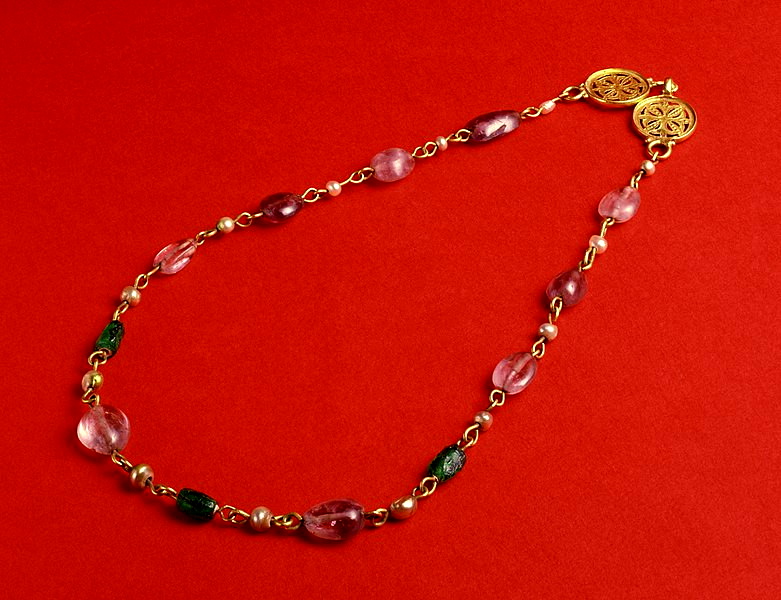 Mfonini a ɛwɔ atifi hɔ no: Afeha a ɛto so 5 sika kɔkɔɔ Byzantine kɔnmuade a wɔde nhwehwɛ ne Misrifo emerald | Mfonini no fi: Walters Art Museum, Ɔmanfo de
Mfonini a ɛwɔ atifi hɔ no: Afeha a ɛto so 5 sika kɔkɔɔ Byzantine kɔnmuade a wɔde nhwehwɛ ne Misrifo emerald | Mfonini no fi: Walters Art Museum, Ɔmanfo de
Tete Emerald Abakɔsɛm & Anansesɛm
Emerald a wotu ho kyerɛwtohɔ fi tete Misraim bɛyɛ afe 1900 kosi 1500 A.Y.B. Egypt kɔɔ so yɛɛ emerald fibea titiriw kosii sɛ Colombia bedii tumi wɔ afeha a ɛto so 16 Y.B.
Tete din a wɔde frɛɛ ɔbo no bi ne:
Bwyrq — Misrifo, “sɛ wɔbɛhyerɛn” .
Barq — Arabfo, “wɔrehyerɛn” .
Baraket — Hebrifo, “aboɔden abo a ɛhyerɛn” .
Ná tete Misrifo bu ahabammono sɛ kronkron, na na ɛyɛ kuayɛ mu awo ne nkwa a enwu da ho sɛnkyerɛnne. Ɔhemmaa Cleopatra agye din sɛ na n’ani gye emerald ho, na ɔde May awobo no siesie ne ho ne n’ahemfie. Nokwarem no, wɔ afe 330 A.Y.B.
Misrifo gyidi ahorow a ɛfa emerald ho no bi ne ɔbo a ɛma owu a enwu da wɔ owu akyi asetra mu — a wɔtaa de si farao adamoa mu de hwɛ hu sɛ eyi yɛ saa — ne aniwa a ɛma aniwa hu ade yiye.
Tete Helafo ne Romafo huu emerald sɛ anyame ne anyamewa a wɔda no adi, titiriw sɛ daa ɔdɔ a ɛbata Aphrodite (Venus) ho sɛnkyerɛnne.
Misrifo akyi no, na tete Indiafo nso bu emerald.
Ná Sanskrit din a wɔde frɛ emerald no yɛ marakata , a ɛkyerɛ “nneɛma a enyin a ɛyɛ ahabammono,” anaa smarahato , a ɛkyerɛ “ahabammono.” Nokwarem no, ɛbɛyɛ sɛ asɛmfua “emerald” no fi tete Persia asɛmfua bi a wɔkyerɛɛ ase kɔɔ Latin kasa mu sɛ smaragdus (a ɛkyerɛ “ɔbo a ɛyɛ ahabammono”) ansa na awiei koraa no wɔresakra no ayɛ no “emerald.
Tete Indiafo kaa emerald ho asɛm wɔ nyamesom nhoma pii mu. Wɔkyerɛwee bɛyɛ afe 1500 kosi 1200 A.Y.B., Sanskrit ne Hindu kyerɛwsɛm a akyɛ sen biara, The Vedas kaa emerald ho asɛm sɛ ɛyɛ anigye na ɛhyɛ yiyedi ho nkuran.
Wɔ Vedic nsoromma mu hwɛ mu no , wɔde emerald anaa panna bata okyinnsoromma Mercury ho na wogye di sɛ ɛma adwene nya nkɔso.
Indiafo adansi asinasin a agye din no wɔ emerald, te sɛ “Taj Mahal Emerald” a wɔasen no fɛfɛɛfɛ ne onyamewa Meenakshi adwini a wɔde emerald ahwehwɛ biako a wɔde kyerɛe wɔ Meenakshi Amman Asɔredan mu na ɛyɛe.
Nea etwa to no, na Inkafo ne Aztekfo wɔ anansesɛm pii a ɛfa emerald ho.
Biako ne sɛ May awobo no fi tete ɔhemmaa bi nusu mu na ɛbae. Foforo nso ne sɛ akwahosan pa nyamewa Umina koma bɛyɛɛ emerald kɛse bere a owui no. Ná wɔde emerald yɛ agude ne nyamesom amanne ahorow, na na wɔtaa de aboɔden abo no gu amusiei nkoko mu.
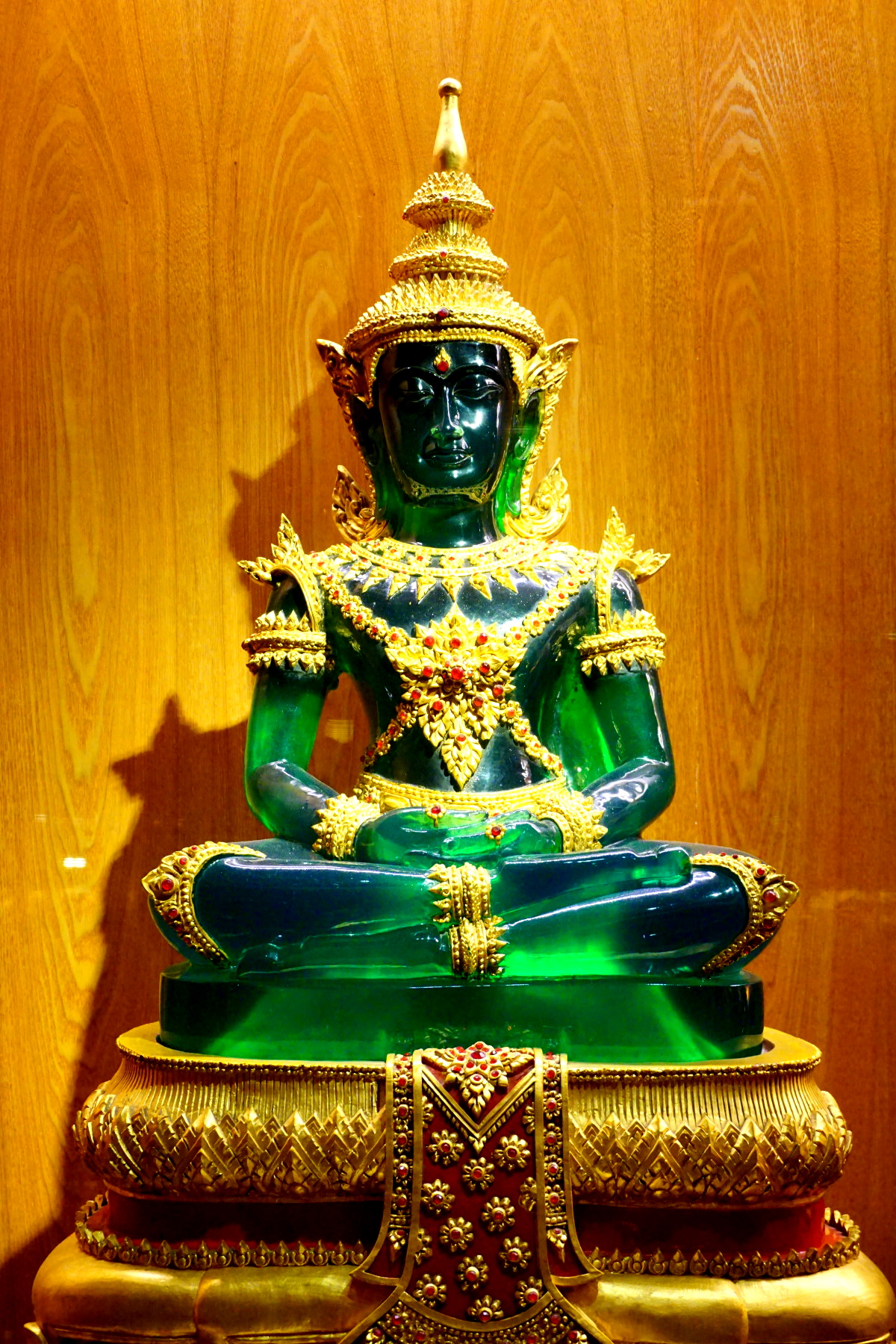 Mfonini a ɛwɔ atifi hɔ: Emerald Buddha, Buddha Nsõ Nkaedum Asɔredan, Singapore | Mfonini no fi: Mfonini Dharma a efi Sadao, Thailand, CC-BY-SA-2.0
Mfonini a ɛwɔ atifi hɔ: Emerald Buddha, Buddha Nsõ Nkaedum Asɔredan, Singapore | Mfonini no fi: Mfonini Dharma a efi Sadao, Thailand, CC-BY-SA-2.0
Emeralds wɔ Royal & Noble Agyapade mu
Abusuabɔ a ɛda emerald ne ahemfo ntam no yɛɛ kɛse bere kɔɔ so. Europa ahemfo ne atitiriw fii ase hyɛɛ May awobo no kɛse wɔ Asetra Foforo bere no mu.
Wubetumi asua pii afa saa adehye emerald yi ho wɔ yɛn akwankyerɛ a ɛfa emerald 7 a agye din ho no mu .
Emerald ahorow bi a wɔanka ho asɛm wɔ saa akwankyerɛ no mu:
Emerald mpɛtea a Pope Innocent III de maa Ɔhene Richard Gyata Koma anaa Ɔhene John bɛyɛ afe 1200 Y.B
Holy Grail of Arthurian lore, a wɔkyerɛ sɛ wɔde emerald na ɛyɛe na ɛwɔ tumi ahorow
Tiara a wɔde emerald mfinimfini abo ayɛ a Napoleon Bonaparte de maa Pope Pius VII wɔ 1804 mu
Vladimir Tiara , a ɔyɛ maa Russia Ɔhemmaa Kɛse Vladimir na ɔtɔn maa Ɔhemmaa Mary I wɔ 1921 mu, na ɔde n’ankasa Cambridge emerald 15 kaa ho
“Emerald” Buddhas , afeha a ɛto so 15 mu Gautama Buddha ho adwini kronkron bi a wɔde jadeite ayɛ ne 2006 de a wɔde emerald biako a ne kɛse yɛ carat 3,600 ayɛ
May awobo no nso wɔ pop amammerɛ ho nsɛm ahorow, te sɛ:
Emerald City kaa ho asɛm wɔ 1900 L. Frank Baum ayɛsɛm The Wonderful Wizard of Oz ne 1939 sini a wɔdannan no mu
“Emerald Isle” abodin a wɔde frɛ Ireland
Emerald Tablet , anansesɛm mu nkyerɛwee bi a wɔkyerɛ sɛ amansan nyinaa ne alchemic ahintasɛm wom
Rockefeller Emerald , emerald a ɛso sen biara a mfomso biara nni ho ne emerald a ne bo yɛ den sen biara a wɔatɔn pɛn wɔ $5.5 ɔpepem USD
Ɛmfa ho sɛ emerald wɔ anuonyam no, ɛda so ara yɛ wɔ Asase so te sɛ aboɔden abo foforo biara!
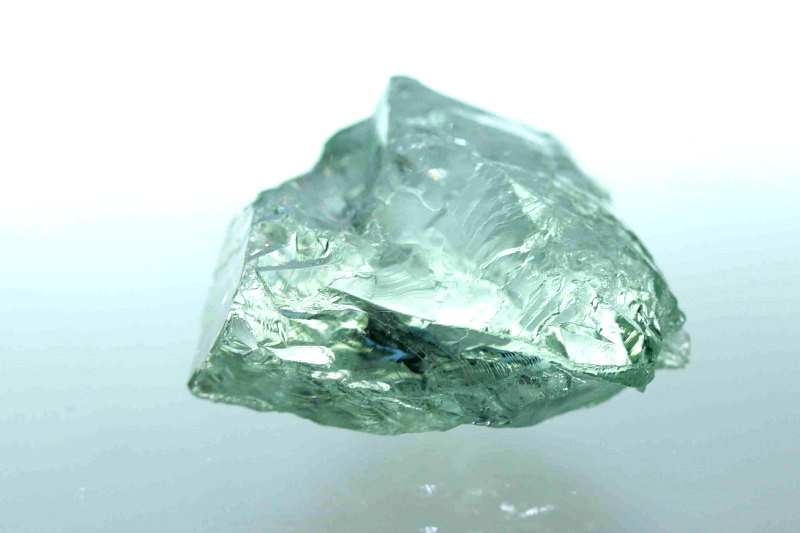
Asase Ho Anwonwade: Emeralds a Wɔhyehyɛe
Emerald yɛ beryl ahorow, beryllium aluminium silicate aboɔden abo. Wɔn wɔ hardness a ɛkorɔn yiye wɔ 7.5 kosi 8 wɔ Mohs nsenia so .
May awobo no kɔla fi efĩ a ɛwɔ chromium, vanadium, anaa n’abien nyinaa mu. Nea emerald ho yɛ na no fã bi ne sɛ beryllium ntaa ntra beae koro no ara a chromium anaa vanadium wɔ.
Wɔ baabi a wohu emerald ho no , Colombia yɛ nea ɛwɔ soro sen biara, na ɛyɛ wiase nyinaa emerald ɔha biara mu nkyem 50 kosi 95. Fibea a ɛto so abien a ɛkorɔn ne Zambia, na ɛyɛ wiase no mu emerald a ɛyɛ aboɔden abo bɛyɛ ɔha biara mu nkyem 20.
Wonim Colombia ne Zambia sɛ ɛwɔ kɔla ahorow a ɛda nsow a wɔfrɛ no emerald.
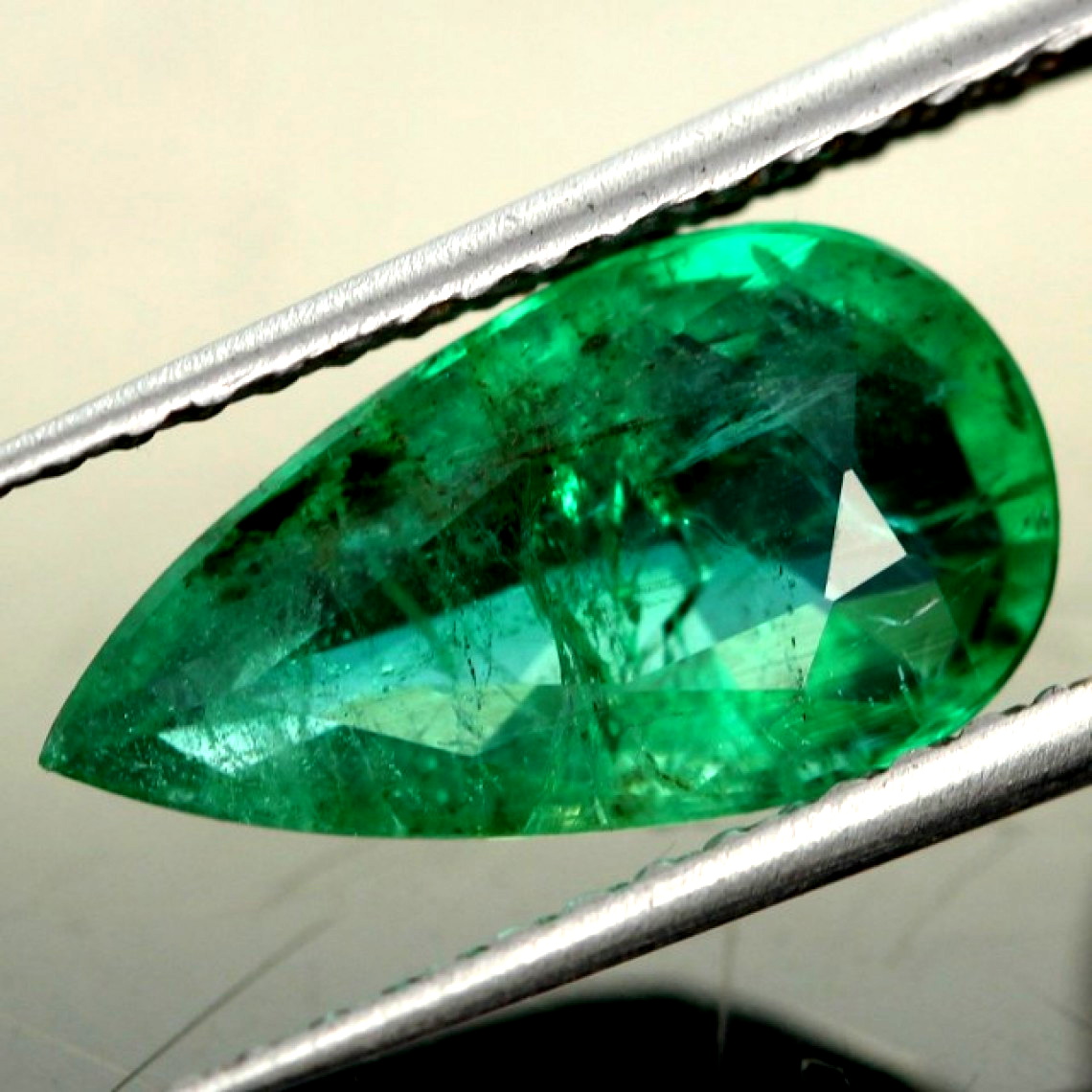 Mfonini a ɛwɔ atifi hɔ no: Zambia emerald a ɛwɔ afã horow
Mfonini a ɛwɔ atifi hɔ no: Zambia emerald a ɛwɔ afã horow
Mesmerizing Green: Emerald Kɔla Ho Ntease
Woasusuw ho pɛn sɛ, sɛ wɔwoo me wɔ May mu a, m’awofo kɔla yɛ dɛn ? Ahabanmono! Nanso ɛsono sɛnea ahabammono yɛ pɛpɛɛpɛ wɔ emerald mu. Nnyigyei a ɛwɔ ase a ɛyɛ kɔkɔɔ anaa bruu abu so, na ɛnne anaa saturation dodow gu ahorow.
Nsonsonoe ahorow a ɛda emerald ankasa ne beryl a ɛyɛ ahabammono ntam no gu ahorow gyina efĩ a ɛwɔ kɔla ne ne sunsuma so.
Emerald ahorow pii wɔ hɔ, ebinom kɔla ne ne fibea na ɛda nsow na afoforo nso wɔ aniwa mu nneɛma a ɛma ɛda nsow :
Colombia Emerald : Wɔsom bo kɛse wɔ kɔla a ɛyɛ ahabammono a emu dɔ a efi chromium pii ne dade efĩ a ɛba fam mu; Wɔsom no sɛ ɛho yɛ na na ɛyɛ fɛ, titiriw Gota de Aceite emerald ahorow a ɛte sɛ nea ɛyɛ basabasa no
Zambia Emerald : Ɛyɛ bruu-ahabammono, ɛyɛ tuntum sen Colombia de, mpɛn pii no ɛnyɛ nea ɛka ho kɛse sen Brazil de
Brazilian Emerald : Ɛyɛ ahabammono a ɛyɛ hann, mpɛn pii no ɛyɛ kɔkɔɔ, ɛnyɛ nea ɛda adi kɛse te sɛ Colombia de no, mpɛn pii no ɛka ho
Trapiche Emerald : Abɔde mu ayɛ radial nsusuwso a 6 tuntum spokes te sɛ ntwahonan
Star Emerald : Ɛda hann a ɛdannan no “nsoromma” a ɛwɔ mframa pii adi denam nsoromma mu hwɛ so
Cat’s Eye Emerald : Ɛda hann a ɛdannan no hann biako adi denam chatoyancy so
Aboɔden abo a ɛyɛ emerald a eye sen biara no yɛ bruu-ahabammono a ɛwɔ ɛnne tuntum a ɛyɛ mfinimfini na ɛyɛ ma a emu yɛ duru, nanso kɔla yɛ ade biako pɛ a ɛkyerɛ bo a ɛsom wɔ May awobo yi so.
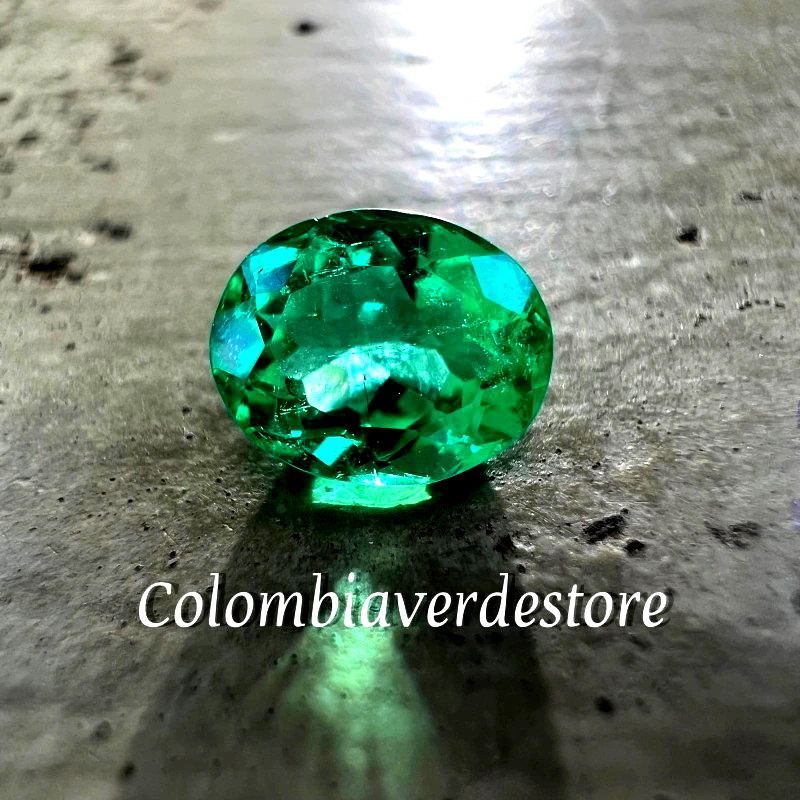 Mfonini a ɛwɔ atifi hɔ no: Colombia emerald a ɛwɔ afã horow a wɔde ngo a ɛnyɛ den ayɛ
Mfonini a ɛwɔ atifi hɔ no: Colombia emerald a ɛwɔ afã horow a wɔde ngo a ɛnyɛ den ayɛ
The 4 Cs: Emerald Su a Wɔbɛhwehwɛ Mu
Sɛ aboɔden abo ho animdefo reyɛ emerald awobo no mu nkyerɛwde anaasɛ wɔredi ho adanse a, wɔde kɔla di kan, afei nea emu da hɔ, na wɔde nea wɔatwa, emu duru a ɛyɛ carat, ne ayaresa di akyi.
Ahosuo
Aboɔden abo ho animdefo dodow no ara bu beryl ahabammono sɛ emerald sɛ ɛwɔ ahabammono titiriw ne ɛnne a ɛyɛ mfinimfini kosi tuntum nkutoo a. Saturation a ɛkorɔn ne kɔla a ɛyɛ ahabammono a ɛho tew kyerɛ sɛ ɛsom bo kɛse.
Ɛda adi pefee
May awo abo yi yɛ Type 3 kɔla aboɔden abo , a ɛkyerɛ sɛ ɛkame ayɛ sɛ nneɛma a wɔde ka ho a wotumi hu wɔ hɔ bere nyinaa. Sɛnea ɛte no, emerald a enni nneɛma a ɛka ho a aniwa nkutoo na wotumi hu no som bo yiye.
Ɛte sɛ nea emerald pii a wɔde ka ho kɛse no yɛ mununkum . Emerald a wɔde ka ho no ahorow pii wɔ hɔ . Mpɛn pii no, wɔyɛ emerald ho adwuma na ama emu ada hɔ yiye.
Twa
Wɔayɛ emerald a eye sen biara no afã horow yiye na ama kɔla ne biakoyɛ ayɛ kɛse, efisɛ ɔbo no apete no sua mmom.
Wɔde “emerald a wɔatwa” a ɛyɛ May awo abo yi mu pii anim, ɛyɛ pon a wɔatwa a wɔyɛe wɔ 1500 mfe no mu maa emerald sɛnea ɛbɛyɛ a ɛremma mpaapaemu anaa mpaapaemu bere a wosi ɔbo no kɔla so dua no.
Wɔtwitwa emerald a ɛnyɛ papa anaa emerald a ɛwɔ aniwa so tumi ma ɛyɛ cabochons .
Carat Mu duru
Te sɛ aboɔden abo afoforo , emerald bo a wɔbɔ wɔ carat biara ho no bɛkɔ soro bere a ɛsõ no.
Ayaresa ahorow
Wɔnam ngo a wɔde gu emerald dodow no ara so, na ɛma emu da hɔ, ɛkyɛ, na ɛtɔ mmere bi a kɔla tu mpɔn denam mpaapaemu a wɔde hyɛ mu ma no so. Ebia lapidaristfo de ngo, polymers, anaa epoxy resins bedi dwuma de ayɛ aduru no.
Grading labs bɛkyekyɛ nkɔsoɔ dodoɔ no mu sɛ biara nni hɔ, ketewa, ɛyɛ mmerɛ, anaa wɔama anya nkɔsoɔ kɛseɛ.
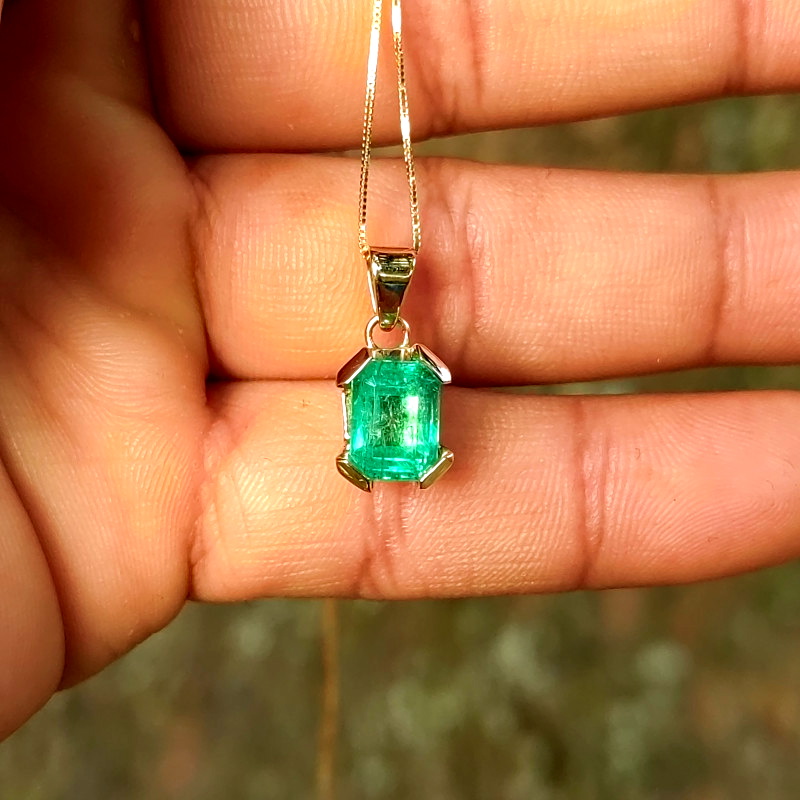
Beyond Aesthetics: Emeralds Nsɛnkyerɛnne ne Ahintasɛm
Wɔde emerald bata onyin, awo foforo, ne awo ho, te sɛ ahohuru bere no ara pɛ. May awobo asekyerɛ no nso trɛw kɔ nokwaredi, adamfofa, ne anigye so.
Nokwaredi a wodi
Wɔ Helafo anansesɛm mu no, na emerald yɛ ɔdɔ ho mfonini na sɛ wɔhyɛ a, ɛbɔ awarefo ho ban na wɔanni nokware. Ná nkurɔfo gye di sɛ emerald bɛhyerɛn kɛse bere a koma a emu tew hyɛ no. Sɛ sunsuma no hinhim fi ne ahabammono ankasa no ho a, ɛnde na wosusuw sɛ nea ɔhyɛ no nni nokware.
Ayɔnkoyɛ
Te sɛ nokwaredi no, emerald kyerɛ nokwaredi a enni nnyinaso biara a ɛda nnamfo ntam. Nnamfo binom paw sɛ wɔbɛhyɛ adamfofa nkapo a wɔde emerald ayɛ de ayɛ wɔn abusuabɔ ho sɛnkyerɛnne.
Ti pa
Mughal ɔhempɔn ne Taj Mahal bɔfo, Shah Jahan, kyerɛw kyerɛw nsɛm guu emerald talismans mu. Wɔ Veda, Hindufo nkyerɛwee mu no, wɔka emerald ho asɛm sɛ aboɔden abo a ɛma obi nya anigye, a etumi ma obi yiyedi tu mpɔn. Wɔ Chinafo amammerɛ mu no, nna bi wɔ dapɛn no mu ma wɔn a wɔhyɛ emerald no nya anigye.
Sɛ́ ɔbo a ɛsa yare , mfaso horow a wɔka ho asɛm kɛse wɔ emerald so no bi ne sɛ ɛma wotumi hu ade yiye, ɛtew nipadua no ho fi yare ho, na ɛma ɛyɛ mmerɛw sɛ wubehu ade yiye, titiriw bere a wɔde di dwuma sɛ aniwa chakra ɔbo a ɛto so abiɛsa no .
Emerald akyidi a Ɛwɔ Abrabɔ Pa
Te sɛ abrabɔ pa ho nsɛnnennen a ɛfa ntawntawdi mu abohene ho no, adetɔfo pii a wɔn ani da hɔ no haw wɔn ho wɔ adwumayɛfo tebea ne sɛnea emerald a wotu no bɛkɔ so atra hɔ no ho.
Ade titiriw a ɛma yehu sɛ ebia wɔde abrabɔ pa na efi emerald bi mu ne sɛ yebehu baabi a efi, anaasɛ “nea ɛda adi pefee sɛ efi bae.” Ɛno kyerɛ sɛ wo ne wɔn a wɔde nneɛma ma a wɔagye din, a wɔahwehwɛ mu yiye ne nnwuma fekuw ahorow bɛyɛ adwuma.
Nea eye ne sɛ, ɛnyɛ den sɛ wubehu emerald mfiase sen diamond de, titiriw wɔ akwan horow te sɛ Emerald Paternity Test a Gemfields ne Gübelin Gem Lab yɛe no so.
Ade foforo a wobetumi ayɛ ne sɛ wɔbɛpaw emerald a wɔayɛ , a wɔayɛ wɔ lab a ɛwɔ abɔde mu emerald honam fam ne nnuru nyinaa.
Emerald a wɔayɛ no nni adwumayɛ tebea a asiane wom a ɛbɛma wɔanya abɔde mu emerald, na ɛka nneɛma a atwa yɛn ho ahyia no so tew kɛse.
Nea ɛka ho no, emerald a wɔayɛ no bo yɛ den koraa sen abɔde mu emerald!
Sɛ yɛreka akwan foforo a wɔbɛfa so ayɛ saa ho asɛm a, so awo abo pii wɔ hɔ ma May? Sɛnea nsɛm bi kyerɛ no, yiw!
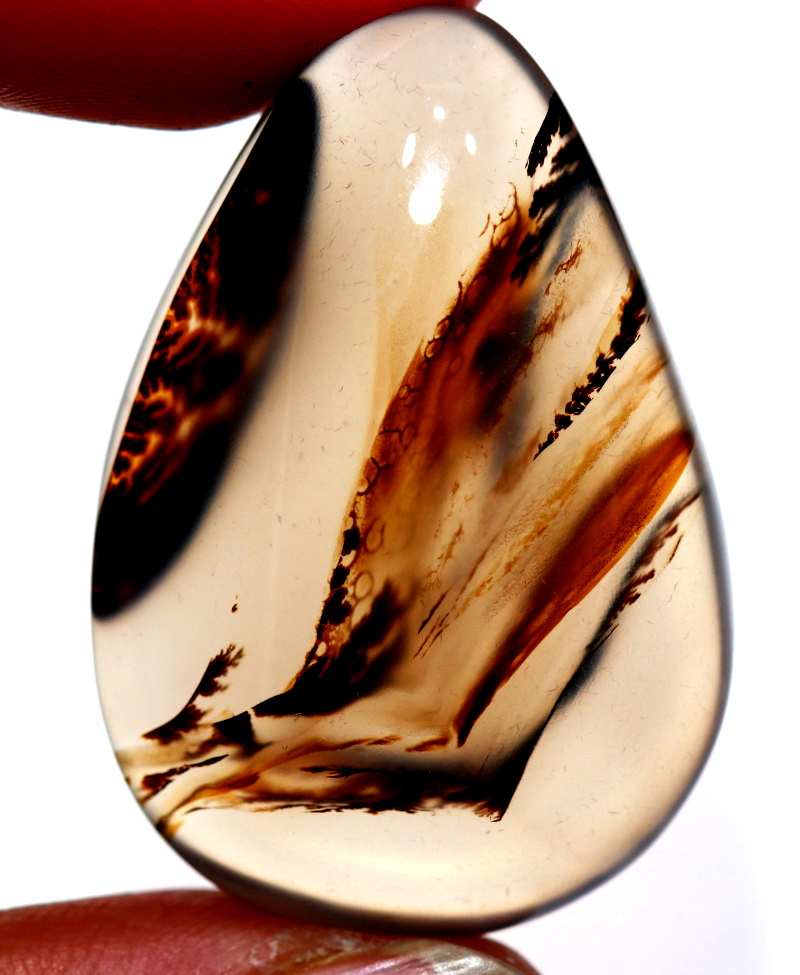 Mfonini a ɛwɔ atifi hɔ no: Agate cabochon
Mfonini a ɛwɔ atifi hɔ no: Agate cabochon
Alternative May Awo Abo a Wɔde Yɛ Adwuma
May awo abo ne ahwehwɛ a wɔahyehyɛ no nkɔ awiei wɔ emerald so. Baako ne sɛ, agate ne May mfitiase awobo ankasa wɔ abakɔsɛm mu nkyerɛase pii mu.
Nokwarem no, wɔakyerɛw chrysoprase a ɛyɛ chrysoprase no sɛ May awobo foforo wɔ nsɛm pii a wɔahyehyɛ mu. Wɔtoo no din “Anigye Ɔbo,” chrysoprase yɛ aboɔden abo a ɛyɛ hare a ɛyɛ ahabammono a ɛyɛ apɔw-mu-teɛteɛ a ɛyɛ pɛpɛɛpɛ ma Gemini nsɛnkyerɛnne.
Wɔ ahintasɛm awo abo a wɔahyehyɛ a egyina Tibetfo nsoromma mu hwɛ mu no mu no, safir ne May awobo no. Saa corundum ahorow yi yɛ aboɔden abo foforo a ɛsom bo a ɛwɔ kɔla ahorow a ɛfata Taurus sɛnkyerɛnne biara a wɔwoo no May mu no dɛ.
Wubetumi nso anya May awobo a ne bo nyɛ den kɛse denam saa emerald a wɔde si ananmu yi so:
Enti, ɔkwan bɛn so na wode May awo abo yi di dwuma?
Personalized May Awobo Akyɛde & Afahyɛ
Awo abo agude yɛ akyɛde a ntease wom a wɔde di ɔdɔfo bi afahyɛ, na wobetumi ayɛ emerald May awo abo agude no sɛnea wɔpɛ, ayɛ no mmerɛw, anaasɛ wɔayɛ no yiye ma ɛne onipa no nipasu ahyia.
Sɛ́ ɛyɛ emerald, agate, anaa awobo foforo no, May awobo akyɛde ho adwene ahorow bi ni:
Ɛmmra sɛ wɔde emerald a wɔatwa no emerald bɛbɔ awobo
Asomuade a wɔde emerald ne chrysoprase ayɛ
Kɔnmuade a ɛkyerɛ May awobo ne nea ɔde akyɛde ma no awobo
Charm bracelet a May awobo ne afoforo personalized charms
Hwɛ a wɔde May awobo a wɔakyerɛw so
Watercolor print of May awobo ne ne su ahorow
Wɔ amammerɛ pii mu no, emerald gyina hɔ ma awo foforo. Yɛrentumi nsusuw ɔkwan pa biara a yɛbɛfa so akɔ w’asetra afe a edi hɔ no mu sen sɛ yɛde emerald aboɔden abo a ɛreyɛ foforo (na ɛhyerɛn) bedi dwuma!
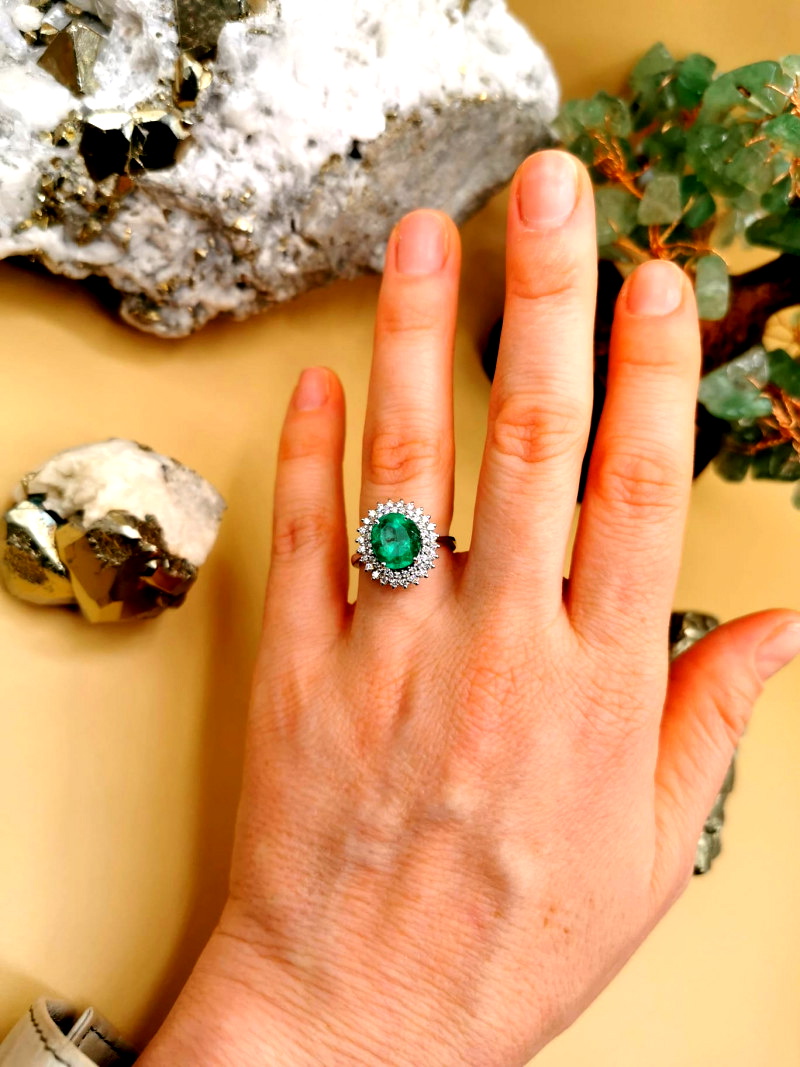
Bra Dɛn May, Ɛmmra sɛ Awo Abo Nni Bere!
May yɛ afifide a ɛrenya nkɔso kɛse, na May awobo emerald no ne saa abɔde mu ahoɔfɛ no di nsɛ. Nanso nea ɛnte sɛ mmere a ɛsakra bere nyinaa no, May awo abo yɛ nsɛnkyerɛnne a ɛyɛ fɛ a ɛyɛ pɛpɛɛpɛ ma afe no mu bere biara!
So emerald, agate, anaa May awobo foforo fata w’anigye?
搜尋Gemstone Encyclopedia
相關拍賣
相關文章
Obiara wɔ aboɔden abo a ɛne ne nsoromma agyiraehyɛde hyia. Wɔsan frɛ eyinom sɛ wo Nsoromma Abo. Sua pii fa saa abo yi ho na hwehwɛ nea wo Nsoromma Abo no yɛ.
10th May 2018
Mfiase no na wɔde Awo Abo anaa aboɔden abo no bata nsoromma mu hwɛ anaa ɔsram a ankorankoro bi awo ho. Hwehwɛ nea wo bo no yɛ na hwɛ abo a yɛwɔ sɛ yɛtɔn no
8th Feb 2021
Gem Rock Auctions wɔ Certified Gemstones a ɛso sen biara wɔ intanɛt so no mu biako. Hwehwɛ aboɔden abo sɔhwɛ afiri a wɔapene so yi mu.
24th Jul 2018
最新的文章
Forsterite yɛ peridot a ɛyɛ aboɔden abo a ɛyɛ aboɔden abo a ne bo yɛ fã bi, a ɛyɛ lime kosi ngodua ahabammono a efi olivine aboɔden abo ahorow kuw no mu no mu aboɔden abo.
26th Feb 2026
Okenite yɛ aboɔden abo a ɛntaa nsi, a ɛte sɛ kotoku a wonim no sɛ ɛyɛ fɛ te sɛ mununkum. Hwehwɛ ne ntease, ne bo, ɔhwɛ ho afotu, abakɔsɛm, mfiase, ne mineral ho nsɛm a ɛkɔ akyiri wɔ akwankyerɛ a edi mũ yi mu.
17th Feb 2026
Heulandite ahwehwɛ fi zeolite mineral abusua no mu na ɛwɔ “funka nsɛso.” Wɔtaa yɛ pink, fitaa, ahabammono, anaa borɔdɔma, na wɔyɛ ahwehwɛ a ahoɔden wom a ɛsa yare. Gem Rock Auctions kyɛ biribiara a ɛsɛ sɛ wuhu fa heulandite ahwehwɛ ho.
12th Feb 2026
文章類別
How To's is where you will find helpful articles from gem Rock Auctions on how to cut gemstones, select gemstones and buy gemstones.
9文章





